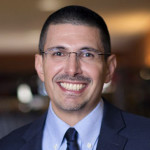David Ernesto Munar is the president and CEO of the AIDS Foundation of Chicago (AFC). He was appointed in February after serving the organization since 1991, most recently as vice president. In June, President Obama recognized Munar as one of nine “Champions of Change” in the fight against HIV/AIDS. Living with HIV since 1994, Munar has used his status to motivate himself to serve others with the virus. As a gay Latino, he also understands the struggles of the communities most disproportionately impacted by HIV/AIDS. Munar shares his vision for the future of AFC and his passion for running for the cause.
How has the job transition been on a personal level?
People have been enormously supportive. I’m proud of my institution for promoting from within, especially someone who is openly HIV positive. I’m still trying to get some of the work I did as vice president covered. But I still want to stay in policy work.
What are your most pressing concerns?
We’ve started our strategic planning process—it’s going to shape our goals for 2012, ’13 and ’14. This is a critical period before health reform is fully implemented [in 2014]. There also will be congressional action during that period on Ryan White funding. We’re aligning our plan with the National HIV/AIDS Strategy (NHAS).
I’m also interested in making sure we do everything we can to meet the needs of the three target populations identified in the NHAS—African Americans, Latinos and gay men—which also are the groups most affected in Illinois.
What is AFC doing in anticipation of the 2012 U.S. presidential election and the XIX International AIDS Conference (AIDS 2012) to be held in Washington, DC?
We’re starting to look at the presidential campaign cycle. The National HIV AIDS Strategy really gives us a framework to engage candidates about their positions on HIV/AIDS. We’re going to push candidates, particularly on whether they’re on board with global and domestic targets.
For about 20 years we’ve supported candidate questionnaires. It’s very ?important that we get to every Republican candidate. If they choose not to ?respond, that’s their choice. But it’s our responsibility to make sure that they hear from us.
As for AIDS 2012, we’re interested in working through the HIV Prevention Justice Alliance and other partners on advocacy training. We’re still figuring it out, but we’re exploring the idea of having a pre-conference session.
Tell us about AFC’s Team to End AIDS.
Team to End AIDS has been a really great fund-raiser for AFC. We train people to complete endurance events. Participants raise funds from their family and friends. This year we have five different events that we’re training people with HIV for in Chicago.
We have also partnered with other groups in DC, Houston and Los Angeles that are using the [t2ea.com] website, the [Team to End AIDS] brand and marketing materials to fund-raise for themselves. It’s exciting to see this program grow.
I’m personally training for several events this year [and some are for Team to End AIDS]. I’m training for my first triathlon. I’m doing a half marathon and a full marathon. I also got a slot in the New York City marathon. If I haven’t collapsed yet, I’ll run the marathon in Honolulu.
I’m excited that [AFC is] sharing this passion for fitness with other people who care about AIDS, including people with HIV.
What are your thoughts on the results of the HPTN 052 study?
We’re excited about the news [that antiretroviral medications can reduce HIV transmission by 96 percent in heterosexual serodiscordant couples], but we’re waiting for the results of other [similar] trials to see if they produce similar results.
The study results give us a new tool to advocate for universal treatment ?access. It can help us advocate for [AIDS Drug Assistance Program] expansion. It makes a compelling argument for why we need comprehensive health reform in the United States.
Addressing stigma is going to be key for us to fully realize the benefits of “treatment as prevention.”
What about PrEP versus PEP to prevent HIV with meds pre- or post-exposure?
We still have to figure out ways to use [pre-exposure prophylaxis or PrEP] ?appropriately. There are enormous implementation obstacles, like financing and identifying the subpopulations for whom it’s most indicated.
One of the big issues around [post-exposure prophylaxis or PEP] is figuring out strategies to get it to people soon after exposure [to HIV]. The science says for PEP to work, a person has to receive antiretroviral medications within 72 hours of exposure, but preferably before 24 hours.
That means we need to have PEP well promoted. We need to have accessibility to PEP in the evenings, weekends and holidays. And like PrEP, the financing for PEP is a challenge.
What are the biggest challenges facing Latinos when it comes to HIV/AIDS?
Latinos are not a monolithic community. There are lots of subcommunities—by nationality, by level of assimilation, if you’re foreign born or U.S. born, documented or undocumented. Support that’s culturally appropriate is a big issue.
In the Latino community, we’re still experiencing violence around HIV. Folks don’t want to talk about things that are “distasteful” and stigmatizing like HIV, which makes HIV education a challenge.
We have large numbers of adolescents, which means large numbers of young gay Latinos who are exploring their sexuality. We have a real opportunity to make sure that young gay Latinos start their sex lives practicing safer sex.
If there is one big issue to focus on in the Latino community when it comes to HIV/AIDS, it would be the silence. Latinos who are openly HIV positive have a real opportunity through our own personal stories to break that silence.
As a long-term survivor, what have you learned living with HIV?
The virus doesn’t transmit a reader’s manual. I wish it did. Everything changes in your life. Your perspective changes. Your relationships with family, friends and partners change. You have to think about health insurance. There’s scarcely any support for how to navigate all that.
I’ve actually been shocked at what little support is available for people with HIV to learn to live with HIV. This is a big flaw in our AIDS service system.
It’s not been easy. If we don’t deal with these issues, then a society benefiting from treatment as prevention, for example, can’t happen. People who are walking around traumatized by their HIV diagnosis are not good candidates for treatment.
I avoided treatment for a long time. I was afraid of the side effects and of having a daily reminder of HIV that I was not ready to accept. It’s something a lot of people experience.
Thankfully, I’ve received support, but a lot of it has been randomly finding pockets of support when I least expected it. Some of it came from incredibly supportive and caring people living with HIV who saw what I needed before I knew what I needed.
Click here for updates from Munar on his POZ blog.







2 Comments
2 Comments